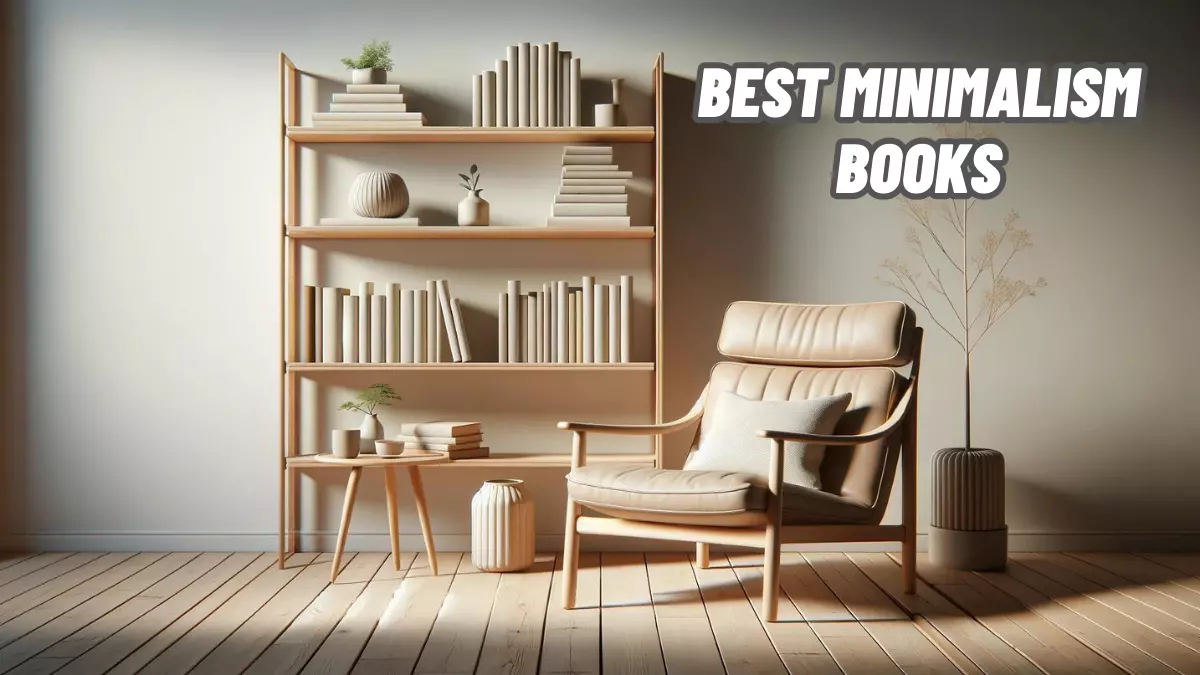Have you ever felt like you are drowning in stuff? A few years back, that was me. My shelves were overflowing, my closet was a mess & honestly, my mind felt just as cluttered.
Then, I stumbled upon a world that promised not just a tidier space, but a clearer mind: minimalism. And guess what? It was in the pages of books where this transformation began for me.
Now, I know you might be thinking, “Another minimalism convert?” But hear me out. If you have ever felt overwhelmed by your possessions, or if you’ve ever had that niggling feeling that there’s more to life than accumulating stuff, then you’re in the right place.
This journey isn’t just about throwing things away. It’s about finding what truly matters. So, let’s dive into these best minimalism books together.
Understanding Minimalism
What is Minimalism? At its heart, minimalism is about stripping away the excess to focus on what’s truly important. It’s not just about having fewer things; it’s about making room for more meaning, joy and peace in your life.
The Benefits:
- Mental Health: Imagine less clutter and more space – not just physically but mentally too. Minimalism can reduce stress and anxiety, offering a sense of calm in a chaotic world.
- Productivity: With fewer distractions, you are free to focus on what matters. It’s about quality, not quantity.
- Well-Being: Embracing minimalism can lead to healthier lifestyle choices and improved well-being. It encourages living intentionally.
Busting the Myths:
- Myth 1: “Minimalism is about owning almost nothing.” Not true! It’s about keeping what adds value to your life.
- Myth 2: “Minimalism is only for certain people.” Nope! Anyone can adopt a minimalist approach, regardless of lifestyle.
- Myth 3: “It’s a one-time purge.” Actually, it’s an ongoing journey of mindful choices.
Remember, minimalism isn’t about removing joy from your life; it’s about finding joy in the things that truly matter.
12 Best Minimalism Books: Reviews & Key Takeaways
The Life-Changing Magic of Tidying Up by Marie Kondo

Marie Kondo’s KonMari method isn’t just about tidying up, it’s a revelation. In her book, Kondo invites us to ask a simple yet profound question: “Does this spark joy?”
If an item doesn’t make you happy or isn’t necessary, it’s time to thank it and let it go. It’s not just about decluttering, it’s about cherishing the things that truly matter.
Key Takeaway:
This book teaches us the importance of emotional attachment to our belongings. It’s not just about the physical item; it’s about the memories, feelings and values attached to it. Kondo’s method is not just a cleaning routine; it’s a philosophy for a more mindful and joyful life.
So, next time you pick up something in your home, ask yourself if it sparks joy. You might just find that this simple question can change not only your space but also your perspective on life.
The Minimalist Home by Joshua Becker
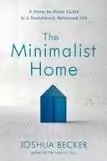
In The Minimalist Home Joshua Becker takes us on a practical journey to transform our homes into spaces of serenity and intentionality.
This book is not just a guide to decluttering; its a blueprint for a complete lifestyle overhaul, room by room. Becker’s philosophy is straightforward: a minimalist home supports and enhances your life’s purpose.
Key Points:
- Becker emphasizes the need to identify the purpose of each space in your home.
- He provides actionable steps to declutter and simplify each room, focusing not just on what to remove, but also on what to keep.
- The book encourages us to let go of possessions that distract us from our goals and values.
Through The Minimalist Home, Becker shows us that minimalism isn’t about giving up things, it’s about gaining clarity, focus and freedom.
By the end of this read, you’ll see your home & maybe even your life in a whole new light.
Decluttering at the Speed of Life by Dana K. White

Dana K. White’s “Decluttering at the Speed of Life” offers a refreshing and realistic approach to tidying up.
Unlike other minimalism books that can seem overwhelming, White understands that life is busy, messy & rarely perfect. Her book is for you, especially if the thought of decluttering feels daunting.
Key Points:
- Practical Strategies: White provides realistic decluttering techniques that can be applied even in the busiest of lives.
- Focus on Progress, Not Perfection: This book emphasizes that decluttering is a journey, not a one-time event.
- Adaptable for Various Living Situations: Whether you live in a small apartment or a large house, White’s advice is flexible and applicable.
The beauty of “Decluttering at the Speed of Life” lies in its understanding that decluttering is more about mindset than just getting rid of things.
It’s about making space for what truly adds value to your life, at a pace that works for you.
Essentialism: The Disciplined Pursuit of Less by Greg McKeown
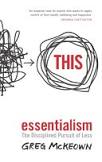
Greg McKeown’s “Essentialism” is not just about decluttering your closet, its about decluttering your life.
This book takes minimalism beyond the physical and into every aspect of your day-to-day existence. It’s about making the most deliberate choices about where to spend your time and energy.
Key Points:
- Selective Focus: McKeown teaches us to cut out the non-essential, so we can concentrate on what truly matters.
- The Power of Less: The book shows how doing less but better can lead to more meaningful and impactful results.
- Practical Techniques: From saying no to unnecessary commitments to prioritizing tasks, McKeown provides actionable advice for a more focused life.
“Essentialism” is a call to end the busy but unproductive cycles we often find ourselves in. It’s a guide to a more intentional and fulfilling life, proving that sometimes, less really is more.
Digital Minimalism by Cal Newport

In a world where we’re constantly connected, Cal Newport’s Digital Minimalism is a breath of fresh air.
This book challenges you to rethink your relationship with technology, advocating for a more intentional use of digital tools.
Key Points:
- Focused Use of Technology: Newport argues for using technology in a way that supports your values, rather than letting it use you.
- The 30-Day Digital Declutter Plan: He introduces a step-by-step plan to reset your digital habits.
- Rich Life Beyond the Screen: The book encourages finding joy and fulfillment in offline activities.
“Digital Minimalism” isn’t about shunning technology. Its about finding a balance where technology enhances, rather than dictates, the rhythm of your life.
If you have ever felt like your gadgets own you more than you own them, this book is for you.
The More of Less by Joshua Becker
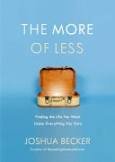
Joshua Becker’s “The More of Less” finds a unique angle in the minimalism conversation. Its not just about having fewer possessions but finding more abundance in what we choose to keep.
Key Points:
- Finding Your ‘Why’: Becker encourages readers to discover their personal reasons for pursuing minimalism, making the journey more meaningful.
- Minimalism in Everyday Life: He provides practical advice on how to apply minimalism principles in daily routines.
- The Joy of Giving: A significant focus of the book is on the satisfaction and freedom that comes from giving and living with less.
In “The More of Less,” Becker masterfully demonstrates that minimalism isn’t about sacrifice. It’s about making space for more: more time, more peace and more joy.
Goodbye, Things by Fumio Sasaki
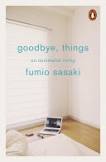
Fumio Sasaki’s “Goodbye, Things” is a deep dive into the minimalist lifestyle from a refreshingly different perspective.
Sasaki’s approach is less about the how-tos of decluttering and more about the profound personal changes that come with saying goodbye to excess.
Key Points:
- Personal Transformation: Sasaki shares his own minimalist journey, highlighting the life-changing impact of owning less.
- Philosophical Insights: The book delves into the philosophy behind minimalism, encouraging a profound reassessment of our relationship with things.
- Practical Tips: While philosophical, Sasaki also offers practical tips to help readers embark on their own minimalist journey.
“Goodbye, Things” isn’t just a guide to getting rid of stuff; its an invitation to a new way of living. It’s about finding richness in simplicity and discovering that less really can be so much more.
The Joy of Less by Francine Jay
Francine Jay’s “The Joy of Less” is a breath of fresh air in our clutter filled lives. Its a book that does more than just advise on how to declutter; its a guide to rediscovering the joy in simplicity.
Key Points:
- Streamlined Living: Jay champions the idea of a streamlined life, focusing on what’s essential and finding happiness in less.
- Mindful Decluttering: The book offers a step-by-step approach to decluttering, encouraging mindfulness about what we own and why.
In “The Joy of Less,” Jay invites you to view your possessions through a lens of purpose and joy. It’s not just about getting rid of things; it’s about creating space for a more meaningful life.
Project 333 by Courtney Carver
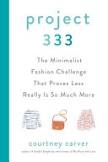
Courtney Carver’s “Project 333” introduces a unique and practical approach to minimalism, especially in the world of fashion.
Its not just a book, it’s a challenge, a minimalist fashion challenge that invites you to live with only 33 items of clothing for 3 months.
Key Points:
- Simplicity in Wardrobe: Carver demonstrates how a limited wardrobe can lead to unlimited peace and confidence.
- Mindful Consumption: The challenge encourages you to be more intentional about your clothing choices, reducing stress and decision fatigue.
“Project 333” isn’t just about minimizing your closet, its a journey towards self-discovery and sustainability.
Zero Waste Home by Bea Johnson
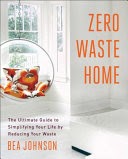
Bea Johnson’s “Zero Waste Home” is a groundbreaking book that takes minimalism beyond decluttering and into a sustainable lifestyle.
It’s a guide that shows how reducing waste and embracing minimalism can have a profound impact on our environment and personal well-being.
Key Points:
- Waste-Free Living: Johnson shares her family’s journey to a zero-waste lifestyle, offering practical tips to reduce household waste drastically.
- Sustainable Practices: The book provides easy-to-implement strategies for cutting down on waste in every area of the home.
“Zero Waste Home” isn’t just a manual for eco-friendly living; its an inspiring tale of how minimalism can lead to a richer, more responsible way of life.
The 100 Things Challenge by Dave Bruno
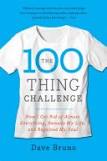
Dave Bruno’s “The 100 Things Challenge” is a radical take on minimalism that will make you rethink your relationship with possessions. It’s not just about owning less, it’s about living more.
Key Points:
- The Challenge: Bruno challenges readers to live with only 100 personal items.
- Simplicity and Freedom: The book explores how limiting possessions can lead to a greater sense of freedom and simplicity in life.
In “The 100 Things Challenge,” Bruno doesn’t just present a theory; he shares his personal journey, inspiring you to consider what’s truly essential.
Company of One by Paul Jarvis

Paul Jarvis’s “Company of One” is a thought provoking read that challenges the traditional notions of business success.
Its a book for anyone who’s ever wondered if there’s an alternative to the relentless pursuit of business growth.
Key Points:
- Rethinking Growth: Jarvis argues that bigger isn’t always better, especially in business.
- Sustainable Success: He emphasizes the importance of building a business that is sustainable, manageable, and fulfilling.
- Minimalism in Business: The book explores how applying minimalist principles can lead to more meaningful and efficient business practices.
“Company of One” is a must-read if you are an entrepreneur, freelancer or anyone interested in integrating minimalism into your professional life. It’s about finding success on your own terms, by doing more with less.
Implementing Minimalism in Different Life Areas
Home and Personal Space
- Declutter Regularly: Start with small, manageable areas. Sort items into categories: keep, donate, discard.
- Organize Thoughtfully: After decluttering, organize what remains in a way that makes your space feel peaceful & functional.
Digital Space
- Audit Your Digital Usage: Inspired by “Digital Minimalism,” take stock of your digital consumption. Ask yourself if each app or digital activity adds value to your life.
- Establish Boundaries: Set specific times for checking emails and social media. Consider digital detoxes to reset your relationship with technology.
Lifestyle Choices
- Mindful Consumption: “The More of Less” and “Goodbye, Things” teach us to be more deliberate about what we bring into our lives, be it physical items or experiences.
- Value Experiences Over Things: Shift your focus from material possessions to experiences and relationships that bring lasting joy and meaning.
Implementing minimalism isn’t just about clearing out your closet; it’s about creating space in your life for what truly matters.
Its a journey towards intentionality in all areas, from your living room to your digital world.
Overcoming Challenges in Minimalism
Common Obstacles
- Sentimental Items: One of the toughest parts of decluttering is dealing with items that tug at our heartstrings.
- Family Resistance: Not everyone in your household might be on board with the minimalist lifestyle.
- Consumer Culture: Living minimally in a world that constantly promotes more can be challenging.
Solutions and Advice
- For Sentimental Items: Take it slow. Keep the items that genuinely mean something to you. Sometimes, taking a photo of the item can help you let go of it while preserving the memory.
- Dealing with Family Resistance: Lead by example. Share the benefits you’re experiencing. Remember, minimalism looks different for everyone.
- Navigating Consumer Culture: Stay mindful of your values and why you chose minimalism. Unsubscribe from marketing emails and avoid impulse buys.
Remember, minimalism isn’t a race or a competition. Its a personal journey, unique to each individual. Be patient with yourself and those around you as you navigate these challenges.
Ending Note:
We have journeyed through the transformative world of minimalism, exploring its many facets through some of the best books on the topic.
Each book offers a unique perspective, but they all share a common thread: minimalism has the power to change lives.
Its not just about decluttering your space; it’s about decluttering your mind, finding clarity and focusing on what truly matters.
Remember the overwhelming feeling of clutter I shared at the start? Now, imagine transforming that chaos into a calm, purposeful life.
That’s the magic of minimalism. It’s about more than just possessions; it’s about discovering a new way of living and thinking.
So, I invite you to take that first step. Pick up one of these books & embark on your own minimalist journey.
Whether it’s clearing out a single drawer or reevaluating your digital consumption, each small step is a leap towards a more intentional and fulfilling life. Trust me, it’s a journey worth taking.

